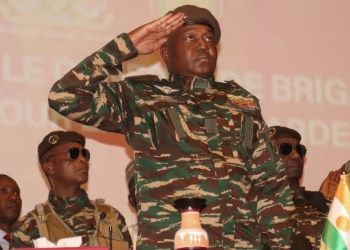At least 492 people have reportedly died in extensive Israeli air strikes targeting Hezbollah in Lebanon, marking the deadliest day of conflict in nearly 20 years, according to the country’s health ministry. Thousands of families have fled their homes as the Israeli military stated it struck 1,300 Hezbollah targets in an effort to dismantle infrastructure established since the 2006 war.
In retaliation, Hezbollah fired over 200 rockets into northern Israel, injuring two people from shrapnel, according to military sources. World leaders are calling for restraint as tensions escalate toward potential all-out war.
Lebanon’s health ministry reported that among the deceased were 35 children and 58 women, with 1,645 others injured. The ministry did not specify how many casualties were civilians or combatants. Health Minister Firass Abiad noted that many families have been displaced by the strikes.
UN Secretary-General António Guterres expressed concern about the rising violence, hoping Lebanon would not become “another Gaza.” EU foreign affairs chief Josep Borrell described the escalation as “extremely dangerous and worrying,” ahead of a meeting of world leaders at the UN in New York, warning that “we are almost in a full-fledged war.”
President Joe Biden indicated that the U.S. is working to de-escalate the situation, aiming for the safe return of residents. The Pentagon announced the deployment of a “small number” of additional troops to the Middle East as a precaution.
Nearly a year of cross-border clashes between Israel and Hezbollah, ignited by the conflict in Gaza, has resulted in hundreds of deaths, predominantly among Hezbollah fighters, and has displaced tens of thousands on both sides of the border. Hezbollah claims it is acting in solidarity with Hamas and will continue until a ceasefire is achieved in Gaza.
The Pentagon confirmed the deployment of more U.S. troops amid the escalating crisis. Pentagon spokesman Maj. Gen. Pat Ryder noted that this move is made “out of an abundance of caution” to bolster existing forces in the region.
Lebanese media reported that the initial wave of Israeli air strikes commenced around 06:30 local time. Eyewitness accounts described a terrifying scene, with missiles flying overhead and the sounds of explosions filling the air.
Numerous towns and regions across southern Lebanon, including Sidon and Tyre, were targeted throughout the day. Reports indicated that a building in the Bir al-Abed area of southern Beirut was struck, allegedly targeting a top Hezbollah commander, Ali Karaki, though it remains unclear if he was killed.
In a desperate attempt to flee the ongoing bombardment, roads were congested with people evacuating. A family on a motorbike expressed their fear and urgency to escape the violence. The Information Minister stated that Israel had urged evacuation from their building, but he refused to comply, deeming it a psychological tactic.
Prime Minister Najib Mikati characterized the ongoing Israeli actions as a “war of extermination,” asserting the government’s commitment to halting the aggression.
The Israel Defense Forces (IDF) reported conducting airstrikes on approximately 1,300 Hezbollah “terror targets,” emphasizing the need to eliminate combat infrastructure developed over the past two decades. The IDF’s Chief of Staff, Lt. Gen. Herzi Halevi, noted the objective of enabling residents in the north to return home safely.
IDF spokesman Rear Adm. Daniel Hagari indicated that videos from southern Lebanon displayed “significant secondary explosions,” likely causing some casualties. Israeli Prime Minister Benjamin Netanyahu urged Lebanese citizens to evacuate areas where Hezbollah has stored weapons, asserting the need to protect Israeli citizens.
A senior Israeli military official emphasized that the IDF’s current focus remains on aerial operations and not an imminent ground invasion. The stated goals include reducing Hezbollah’s capability to launch attacks into Israel, pushing their forces back from the border, and destroying critical infrastructure.
Hezbollah has not commented on Israeli claims regarding weapon storage in civilian areas but confirmed its continued rocket attacks on Israeli military bases. The IDF reported that 210 projectiles were launched from Lebanon, impacting various regions within Israel, including the Lower Galilee.
Despite significant losses, Hezbollah remains a formidable force, with recent weeks characterized as among the most challenging for the group since its formation. Following a series of recent airstrikes, Hezbollah’s deputy leader vowed not to back down, declaring a new phase in their struggle.
Amidst the turmoil, some residents of Beirut expressed fears about an escalating war, while others maintained a defiant stance, insisting on their right to defend themselves.















